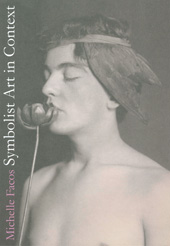The Symbolist art movement of the late nineteenth century forms an important bridge between Impressionism and Modernism. But because Symbolism, more than the two movements it links, emphasizes ideas over objects and events, it has suffered from vague and conflicting definitions. In Symbolist Art in Context, Michelle Facos offers a clearly written, comprehensive, and accessible description of this challenging subject. Reaching back into Romanticism for Symbolism's origins, Facos argues that Symbolism enabled artists (including Munch and Gauguin) to confront an increasingly uncertain and complex world―one to which pessimists responded with themes of decadence and degeneration and optimists with idealism and reform.
Department of Art History social media channels
- College of Arts & Sciences
- Department of Art History

 The College of Arts
The College of Arts